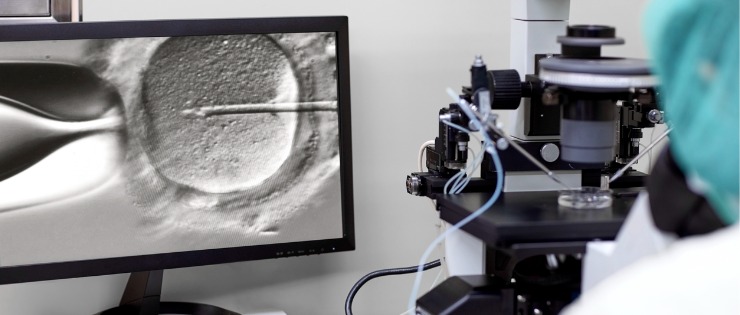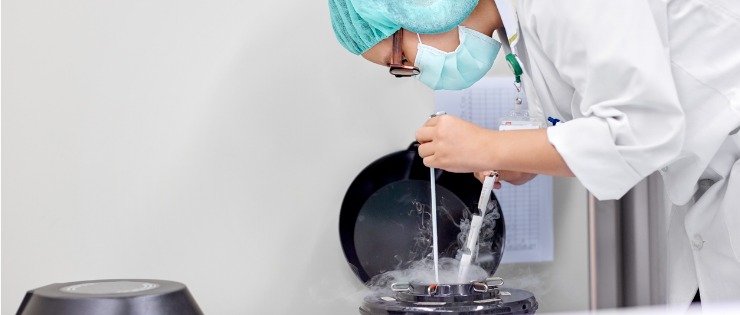
Preserving your fertility by freezing your eggs is an option more women are now considering than ever before. Do your research to understand what is involved and whether you want to proceed.
What is Egg Freezing?
Known as mature oocyte cryopreservation, egg freezing is all about harvesting a woman’s eggs from her ovaries and freezing them unfertilized for later use. When the woman is ready to be pregnant, the eggs can be thawed and combined with sperm in a lab before being implanted in the uterus. In vitro fertilisation (IVF) began in Australia in 1970 with the first pregnancy in 1973.
Who is Egg Freezing For?
Women decide to freeze their eggs for a variety of reasons, some include:
Age
Advancing maternal age makes conception more difficult and poses greater health risks for the mother and baby. By freezing eggs in their twenties or early thirties, a woman can improve her chances of becoming pregnant and carrying a baby to full term compared to trying to conceive in their late thirties and older.
Medical Treatment
Some cancer treatments can put male and female reproductive health at risk. A woman who is about to undertake chemotherapy may be recommended by her doctor to freeze her eggs in case of going through premature menopause.
No partner
While women can use a donor sperm to fertilise their frozen eggs, and become a solo mum, some women prefer to wait until having a partner to have a child. Freezing their eggs can decrease the pressure of finding the right partner and starting a family early in the relationship.
Career
Many women’s peak career advancement years coincide with their most fertile time. Some women prefer to focus on their career first, being having children. In these cases, freezing their eggs is a viable option to start a family once they feel ready to do so.

Process Involved in Egg Collection
There are several steps involved in the egg collection process that are completed over a number of weeks:
Step #1: The patient chooses the fertility clinic and meets with a doctor who will explain the process and order some tests.
Step #2: The patient completes testing to rule out diseases including hepatitis B & C and HIV.
Step #3: The patient takes the doctor's script for fertility drugs to a pharmacy and follows directions daily for injection.
Step #4: The clinic monitors the patient’s progress with ultrasound and blood tests to check on the development of follicles (sacs containing the eggs).
Step #5: When the eggs are mature, they are retrieved while the patient is under light anaesthetic.
Step #6: The patient is informed on the number of eggs successfully retrieved and the eggs are frozen in liquid nitrogen.
Most women in their 20s and early 30s can expect to retrieve 15-20 fertile eggs. After the age of 35 years, a woman can expect to retrieve fewer eggs. The number of eggs a woman needs to freeze for a good chance to become pregnant depends on their age at the time of retrieval. For women under 35 years, one retrieval round is often enough but for an older woman their doctor may recommend several rounds because of the decreased egg production, and an increased chance of more eggs being lost during thawing and of having a chromosomal abnormality.
Cost of Egg Freezing
The cost of freezing your eggs in Australia can vary depending on a number of factors.
Fertility preservation due to upcoming medical treatment such as chemotherapy is the only situation where Medicare rebates can apply. Medications for elective egg freezing are not covered under the Pharmaceutical Benefits Scheme (PBS) so patients must pay the full cost. Assisted reproductive technology (ART) including IVF has a Medicare rebate when it involves an insemination procedure. Otherwise, the patient and their health insurance provider (if they’re eligible) must cover all expenses.
The fees include:
- Treatment cycle to stimulate ovaries
- Medications
- Fee for day surgery
- Anaesthetic fee
The total cost can be around $10,000 but varies with the doctor and hospital. Moreover, there is also an annual cost of storing the eggs and opting for a Medicare rebate won’t apply even if the purpose is medically related. Most clinics have alternative methods to pay later or sort a loan scheme to aid with up-front full costs.

Difference Between Egg Freezing and Embryo Freezing
Some women may have a choice between egg and embryo freezing. For women who haven’t met the partner they want to have children with, the decision would be to choose egg freezing. For those who have a partner or are choosing to use donor sperm, they can opt for freezing embryos instead of eggs.
Frozen embryos have a slightly higher pregnancy success rate than frozen eggs. Some doctors will recommend to fertilise the eggs and freeze the embryos if the woman has chosen the father of their child. Women who are undergoing active IVF treatment may put their embryos on ice briefly to increase their pregnancy success rate.
Success rates of egg and embryo freezing
With a new technique of flash freezing, frozen eggs have a survival rate of 90+% and frozen embryos one of 95%. By freezing embryos, a woman knows exactly how many eggs were healthy enough to fertilise. Whereas by freezing eggs, one won’t know how many eggs will fertilise in the future.
IVF clinics often publish their rate of births per complete egg retrieval cycle to help women choose which clinic to attend. The success rate of women aged 35-42 years is much lower than patients who are under 35 years.
Women also need to consider future implications of freezing embryos compared to eggs. Breaking up with their partner whose sperm was used to fertilise the eggs may lead to complications regarding permission for the embryos to be used and in that case, the eggs would be discarded. By freezing her eggs, the woman would have had the option of using them with a new partner or donor. For some, discarding embryos is against their ethical and religious beliefs, which is also a factor to consider.

Potential Risks of Freezing Eggs and IVF
IVF is a medical treatment that comes with some risks.
Over Stimulation of Ovaries
The IVF is considered a safe process, however a minority experience complications. Around 5% of women suffer from ovarian hyperstimulation syndrome (OHSS). The adverse reaction is caused by the daily fertility drugs used to stimulate the growth of eggs. In severe cases, OHSS can cause blood clotting in the legs or lungs and fluid build up in the lungs. Around one third of patients using the injected fertility drugs experience swelling of the abdomen, nausea and discomfort. And while rare, OHSS can be fatal.
False Sense of Hope
Freezing eggs at a relatively young age won’t guarantee a successful pregnancy for a woman to become a mother. Going through this procedure may generate an increased sense of hope that could negatively impact the woman’s mental health.
Complications of IVF
IVF is an invasive treatment with side effects and risks that should be always considered. The egg retrieval process can cause bleeding, infections, and damage to the bowel or bladder. With IVF there is a greater risk of thrombosis, ectopic pregnancy, placenta previa, spontaneous abortions, multiple births, premature birth and other pregnancy and childbirth complications.

Need Health
Insurance?
We've got you covered
Call 1300 134 060 or Get a quote
Maternal Age
Even though a woman is using her eggs previously frozen, one still needs to consider their age during pregnancy. The female body is predisposed to conceive and be pregnant in early adulthood years. Older mothers have higher risk factors for gestational diabetes and hypertension compared to younger mothers. Moreover, obstetricians are more likely to recommend an elective caesarean for older mothers.
Emotional Toll
Most women who have gone through IVF recall it being one of the most emotionally difficult times of their life. The drugs used to stimulate the ovaries and the procedure itself can take a heavy toll on a woman’s mental health.
Nevertheless, the desire to become a mother for the first or subsequent time often outweighs the risks by far. If you’re considering freezing your eggs and undergoing IVF treatment, it’s important to understand the risks and know the possible complications.
Bringing a new baby into the world is a wonderful experience, but we know that it can also be overwhelming - this includes deciding whether or not to opt in to maternity cover. This decision needs to be made before becoming pregnant. HIF's premium hospital policy covers a range of pregnancy and birth-related services, including assisted reproductive technology such as IVF, especially for women having difficulties in becoming pregnant.